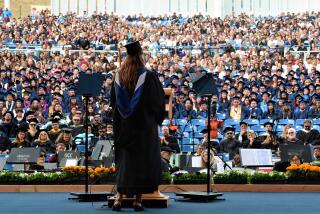State Orders Closure of Area School
- Share via
Capping an 18-month legal fight, state regulators have ordered the closure of Glendale-based Kensington University for awarding degrees without proper academic standards and other violations.
Kensington, a private study-at-home-school that has been in operation 20 years, must stop enrolling new students and face negotiations with the state over what will become of its more than 600 students, under a ruling released Wednesday by the state Council for Private Postsecondary and Vocational Education.
Although it stopped short of calling the school a diploma mill, the council found practices that strongly suggest that “little or no rigor or credible academic standards are necessary in order to be awarded an advanced degree at Kensington University.” The school claims more than 6,000 graduates and caters largely to working adults.
In its 13-page ruling, the council reported a long list of problems at Kensington that included the conferring of doctoral degrees after as little as three months’ work, and awarding excessive academic credits for students’ “life experiences,” such as their work history.
The council also said the school kept scant documentation on how academic credit was awarded, had lax academic standards, and allowed students to earn degrees for substandard work and without required courses. Faculty members sometimes were not qualified to teach courses they were assigned.
The founder and head of the for-profit university, Glendale attorney Alfred Calabro, did not respond to repeated requests for comment Wednesday. Council officials said they had not heard from him either.
Calabro has a long history of waging legal battles with state regulators.
Unless Calabro can overturn the ruling, the school later this month will be barred from enrolling new students, though current students may be allowed to finish their programs. No new degrees could be awarded, but prior degrees from the school would remain valid.
Housed entirely in a Glendale mid-rise office building that also contains Calabro’s law practice, the university does not hold traditional classes. Instead, students typically read portions of books and articles at home, then send in written reports and tests for academic credit.
Kensington is part of a little-known second tier of higher education in California, a state-regulated collection of more than 200 private colleges and universities. These schools are approved to award degrees, but unlike most institutions, lack the academic seal of approval that comes from official accreditation with the Western Assn. of Schools and Colleges.
Nevertheless, Kensington awards bachelor’s, master’s and doctoral degrees in a wide range of fields. Tuition last year ranged from $2,500 per year in the university’s program for aspiring attorneys to about $4,500 for a complete doctoral program.
The council in July 1994 denied Kensington’s request to continue operating under tougher new state regulations that took effect in 1991. But Calabro, the brother of Glendale Municipal Court Commissioner Daniel Calabro, won a court-ordered stay of that decision.
An administrative law judge who heard the case accepted many of the state’s accusations but recommended last September that Kensington be given two more years to comply. But the state council, which was not bound to accept the recommendation, rejected his finding in October and reaffirmed its original ruling in Wednesday’s decision.
“The violations are substantial and they go to the quality of the education,” said council Vice Chair Elena Ackel, a Los Angeles legal aid attorney. “When you have violation after violation after violation, you have to ask, ‘When is enough?’ ”
More to Read
Sign up for Essential California
The most important California stories and recommendations in your inbox every morning.
You may occasionally receive promotional content from the Los Angeles Times.












